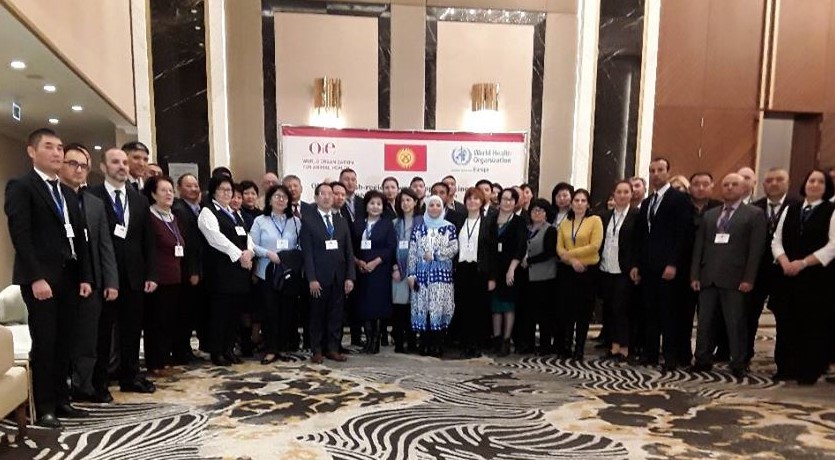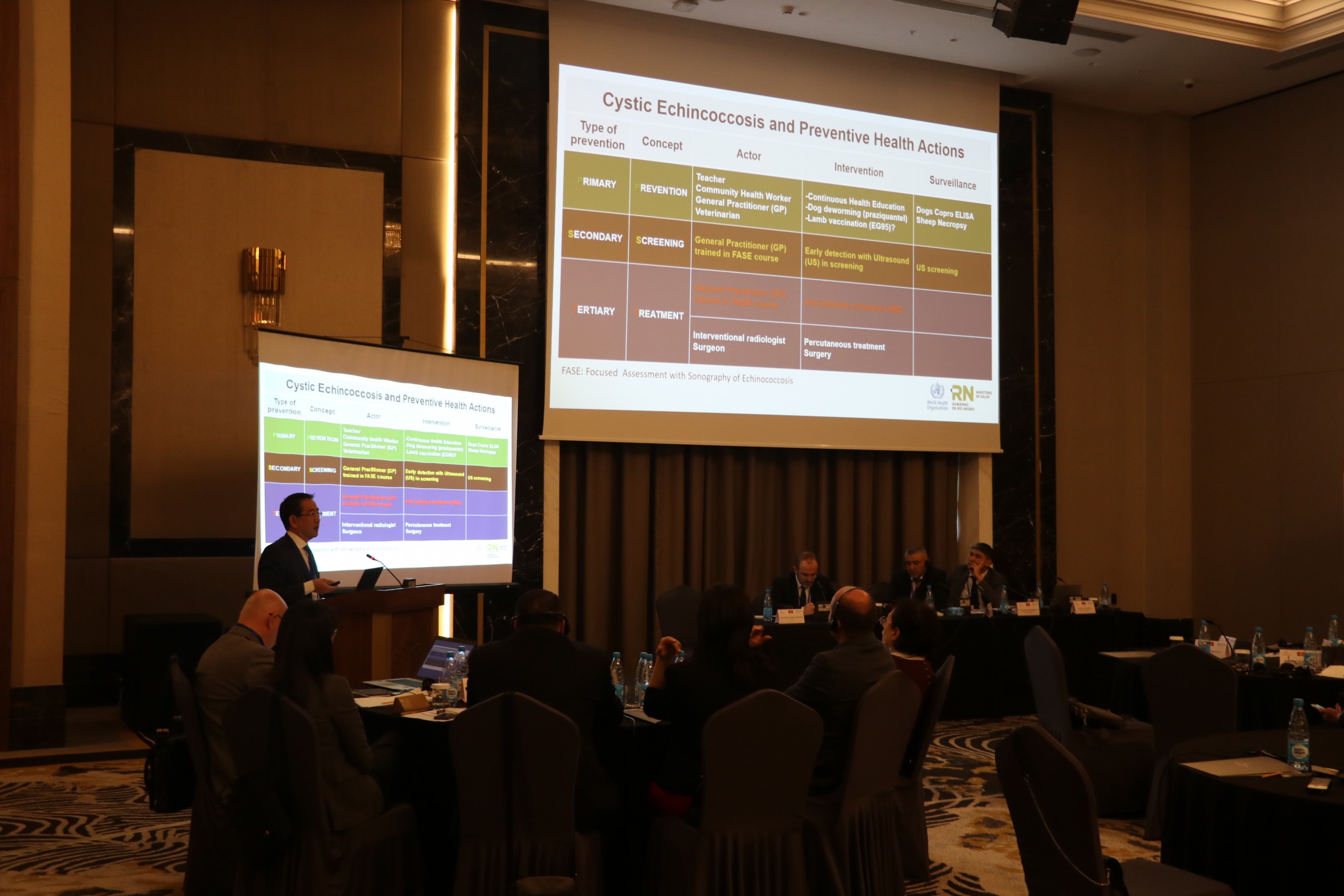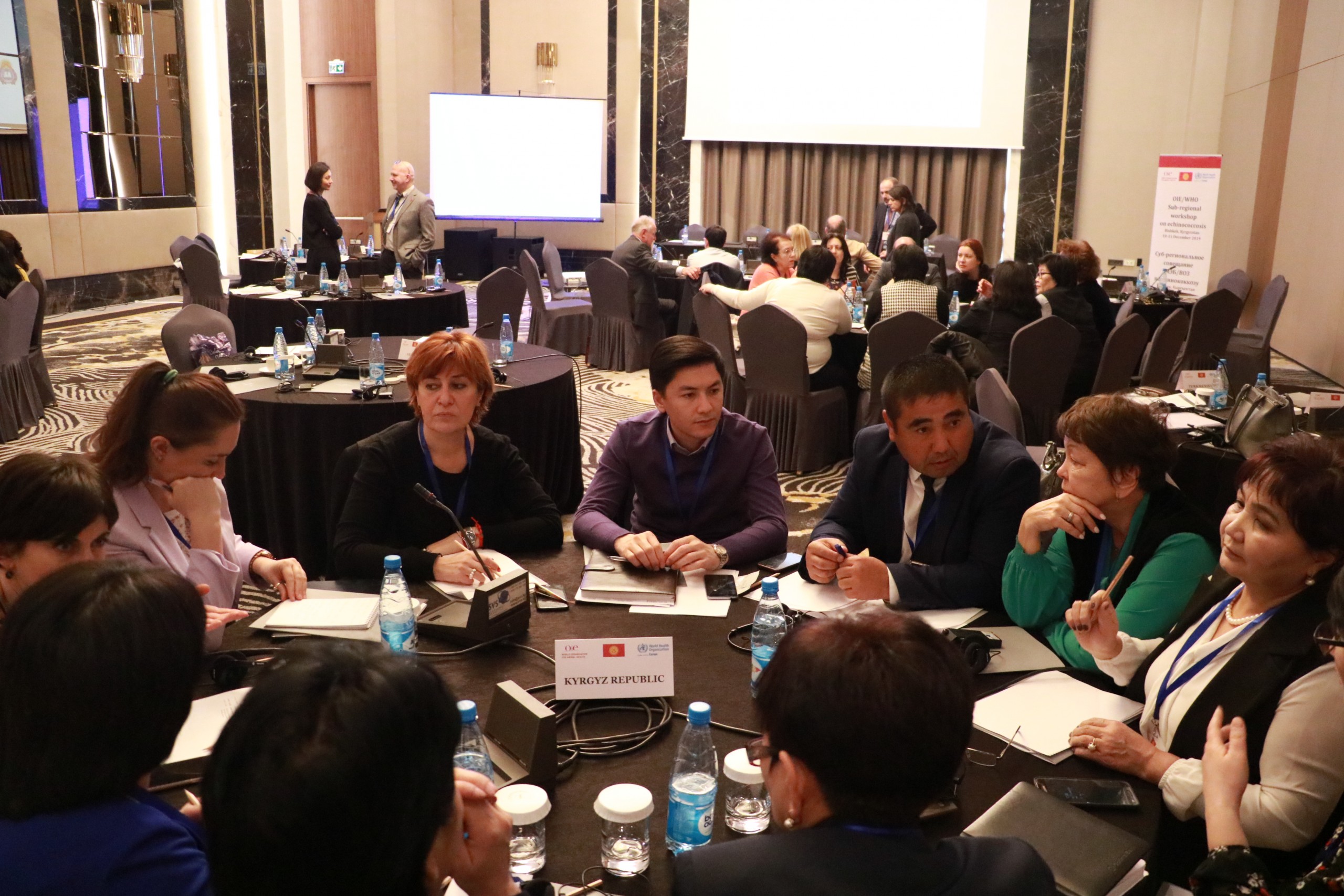The elimination of echinococcosis, a neglected parasitic disease of humans and animals, is on the agenda of the Veterinary Services and Public Health Services of the Central Asian and South Caucasian countries. For the second time, the representatives of the eight countries have collaborated to discuss the relevant control measures and to exchange their experiences and best practices to prevent and eliminate this zoonotic disease.
Under the “One Health” concept, the OIE Sub-regional Representation for Central Asia, in collaboration with the WHO Regional Office for Europe launched the sub-regional dialogue on zoonotic diseases. This meeting is also aiming to strengthen the multi-sectoral collaboration at the national level in all countries between Veterinary and Public Health Services.
All participated countries expressed concern regarding poor collaboration between national animal health and public health sectors. “The level of coordination between veterinary and public health sectors regarding control of echinococcosis remains zero”, reflects one of the representatives of the public health sector.
The OIE and the WHO continue to give support to the countries to set up a national effective collaboration between the sectors by holding the IHR-PVS National Bridging Workshop. The WHO and the OIE have developed tools to assist their Member Countries to implement their respective standards and help them to identify tailored and coordinated strategies to deal with national health risks at the human-animal interface.
To date, not all participated countries have a control strategy for echinococcosis. Only Azerbaijan, Georgia, Kyrgyzstan, and Uzbekistan have been implementing the control strategies. “Echinococcosis control program must be created with supportive regulation, and implemented by a national competent authority, for instance, the Ministry of Health, if the country wants to achieve a proper level of control and eradication of the disease”, believes Dr Leonardo Uchiumi, Temporary Advisor for the WHO, based on forty years’ experience of Cystic Echinococcosis Control Program of Rio Negro Province, Argentina. It is strongly recommended that a control program for echinococcosis must be implemented to reduce the disease prevalence in humans, livestock, and dogs. An educational campaign should be developed for the general public to raise awareness about good practices to reduce disease transmission and the human-animal-environment interface.
The participants recognize the significance of deworming in the control of echinococcosis. The deworming policy varies widely from country to country and depends on funding. For instance, in 2019, in Kyrgyzstan, the number of identified and registered dogs is 443 000 and the deworming of these dogs is carried out four times a year within the framework of the Access to Markets Project. The situation in Armenia is as follows: dog deworming is carried out in private veterinary clinics three or four times a year, depending on the recommendation of the veterinarian or the animal owners’ requests. The importance of regular deworming should be reflected in national One Health educational programs on echinococcosis for farmers, dog owners, and the general public.
According to the participants, one of the reasons of the inadequacies in the control of echinococcosis is the on-the-holding (farm) slaughtering of the livestock for own consumption, which is prohibited by the national laws for some animal species (e.g. cattle), and at the same time still commonly practiced. “Private on-farm slaughter for own consumption is also among the sources of the spread of the disease: infected fresh offal, mostly liver, and lung, of the slaughtered livestock, particularly the sheep, are given raw to the dogs. That shows the lack of awareness of the population on the cycle of the echinococcosis, pointed out one of the participants of the event. All critical activities that are required to interrupt transmission of the disease must be implemented in animals. The insufficient awareness-raising campaign plays also an important role. Each sector, independently, undertakes public education activities on echinococcosis. It is critical to ensure that people living in endemic communities receive appropriate health education on how to protect themselves from infection. “The comprehensive communication campaign leads to community understanding, accepting and supporting other control measures, for instance, dog deworming and livestock vaccination”, considers the speaker.
Nevertheless, the participated countries have committed themselves:
The organisations expressed their readiness to support countries with the coordination and organisation of such meetings, to develop the template of the control strategy for echinococcosis, as well as to provide technical support and guidance.
Controlling echinococcosis in animals is the most effective and economical method of protecting human health, for which there is a need for coordinated activities between veterinary and public health authorities, supported by continuous education of professionals and awareness-raising of animal holders. Control and prevention of zoonosis can be achieved only through joint efforts between Public and Animal Health. Multidisciplinary and multisectoral collaboration is needed to deal with the issue and to reduce its impact. The OIE and the WHO will also engage actively in the regional context to ensure better collaboration and coordination in the frame of the “One Health” concept.
The OIE and the WHO warmly thank the Government of the Kyrgyz Republic for hosting this event.



